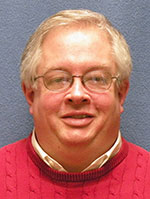Faith and Family / Sean Gallagher
Stories of ancestors are like the Bible of our families
 Through the years, my boys have often asked me to tell them stories of the things I did when I was their age in the 1970s and 1980s. I’ve also shared with them stories about my dad growing up in the 1940s and 1950s and my paternal grandfather (their great-grandfather) as he came of age about a century ago.
Through the years, my boys have often asked me to tell them stories of the things I did when I was their age in the 1970s and 1980s. I’ve also shared with them stories about my dad growing up in the 1940s and 1950s and my paternal grandfather (their great-grandfather) as he came of age about a century ago.
My youngest son Colin doesn’t care if he’s heard a story for the first time or the 100th. His older brothers were the same.
There’s something very human in desiring to hear such stories from the past. They point to an innate awareness in us that we are not alone but very much connected to others, including those who died long before we were born. They’re a human longing for what we Catholics call the communion of the saints.
My sons have a real communion with my grandpa, Victor Gallagher, who died in 1989, 12 years before my wife Cindy and I were married and 13 years before our oldest son Michael was born.
The kinship they feel with him comes tangibly through them hearing so many stories that show forth his personality, his hard work as a farmer, the love he showed for his family and, most especially, for God and the Church.
This mental picture of Grandpa is taking on more flesh for them after we discovered in a box at home a handful of notebooks in which he kept a daily diary in the last decade of his life. The box came into our possession after my dad died about a year ago.
These diaries weren’t deeply private affairs, but just short accounts of what Grandpa did from day to day—when he got up, what he had for breakfast, things he did during the day, scores of sports events he watched on TV, etc.
Grandpa had a stroke in 1973 that lessened his short-term memory, although his long-term memory remained sharp. His diary may have been an aid for him to remember what happened recently.
I knew of those diaries when I was a young boy and loved reading them. It made me feel like I was living right next to Grandpa all the time. Reading them now 33 years after he died renews my love for him and my admiration of his simple and steadfast holiness.
The Acts of the Apostles, which is a source of readings at Mass throughout the Easter season, is like the daily diary of the early Church.
When you hear passages from this book proclaimed at Mass or when prayerfully reading it on your own, let your heart and mind enter into the stories presented to you of the Apostles and those brought to faith in Christ through their preaching and witness.
When you do this, no matter how many times you may have heard these stories before, God’s grace can build a strong spiritual kinship in you with these first believers from 2,000 years ago.
Then that grace will empower you to imitate—in whatever small or sometimes big way—the example of faith and loving sacrifice of the earliest Christians shared with us in Acts.
Seeing Acts in this way can be an invitation to look on the stories of our parents, grandparents and ancestors further in a new light. Grace can open our eyes to see deep meaning in the everyday witnesses of faith of our deceased loved ones.
God will work through this communion of the saints in our own families to draw us here and now closer to him, the Church and, ultimately, to the great reunion of our family of faith in heaven. †
 Through the years, my boys have often asked me to tell them stories of the things I did when I was their age in the 1970s and 1980s. I’ve also shared with them stories about my dad growing up in the 1940s and 1950s and my paternal grandfather (their great-grandfather) as he came of age about a century ago.
Through the years, my boys have often asked me to tell them stories of the things I did when I was their age in the 1970s and 1980s. I’ve also shared with them stories about my dad growing up in the 1940s and 1950s and my paternal grandfather (their great-grandfather) as he came of age about a century ago.